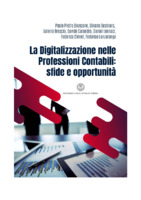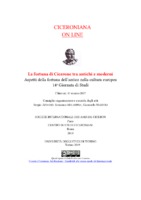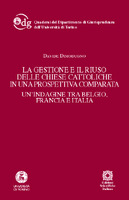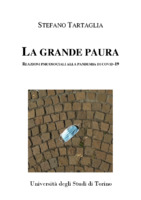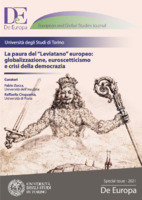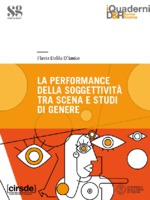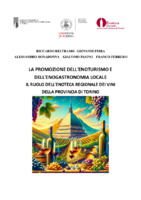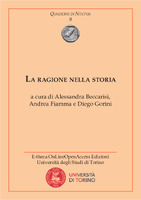Sfoglia documenti (233 in totale)
Sort by:
La digitalizzazione nelle professioni contabili: sfide e opportunità
La digitalizzazione è sempre più diffusa in innumerevoli campi della conoscenza. Tra questi anche la contabilità e il bilancio che non ne rappresentano di certo un’eccezione e sono sempre più esplorati dai ricercatori di tutto il mondo. La volontà di analisi e la ricerca di risposte ad eventi e modifiche esterne deriva, in realtà, da una diffusa trasformazione digitale. Se nei percorsi industriali, in quelli bancari e sanitari, l’innovazione digitale e aperta stanno trovando interessanti implicazioni, la contabilità e la redazione del bilancio, rimangono ancora ai margini di applicazioni più avanzate di ricerca interventista. L’evoluzione digitale attraverso applicazioni pratiche e di supporto all’utilizzatore è in grado di promuovere efficienza, produttività e competitività negli studi professionali e nelle aziende, in primis, nei dipartimenti di contabilità, bilancio e finanza. La ricerca, condotta attraverso un questionario inviato a livello nazionale, raccoglie esperienze di utilizzo della tecnologia di 215 studi professionali. I risultati dimostrano un'accelerazione dell'adozione della tecnologia negli ultimi anni grazie all'adozione della fatturazione elettronica. Tuttavia, dimostriamo attività effettuate con processi improduttivi e poco efficienti come la redazione manuale della prima nota. A livello di implicazioni future, la ricerca apre la strada ad interessanti prospettive per l'adozione della blockchain e dell'intelligenza artificiale negli studi dei professionisti.
La fortuna di Cicerone tra antichi e moderni. Aspetti della fortuna dell'antico nella cultura europea. 14a Giornata di Studi. Chiavari, 11 marzo 2017
Il fascicolo II, 1, 2018 di Ciceroniana On Line ospita gli atti della 14a Giornata di Studi, Aspetti della fortuna dell'Antico nella cultura europea, svoltasi a Chiavari, l’11 marzo 2017, organizzata e curata da S. Audano, E. Malaspina, G. Mazzoli e dedicata al tema La fortuna di Cicerone tra antichi e moderni.
Ciceroniana on Line volume II, 1, 2018 publishes the proceedings of the international conference Aspetti della fortuna dell'Antico nella cultura europea. La fortuna di Cicerone tra antichi e moderni. The conference took place on March 11., 2018, in Chiavari and was organised by S. Audano, E. Malaspina, G. Mazzoli.
Ciceroniana on Line volume II, 1, 2018 publishes the proceedings of the international conference Aspetti della fortuna dell'Antico nella cultura europea. La fortuna di Cicerone tra antichi e moderni. The conference took place on March 11., 2018, in Chiavari and was organised by S. Audano, E. Malaspina, G. Mazzoli.
La gestione e il riuso delle chiese cattoliche in una prospettiva comparata. Un’indagine tra Belgio, Francia e Italia
La riflessione sui temi della gestione e del riuso degli edifici di culto, già avviata in una precedente monografia, giunge a compimento in questo volume mediante l’approfondimento delle esperienze di Belgio e Francia. Questi Paesi, seppur di antica tradizione cattolica, sono oggetto da decenni di un processo di secolarizzazione avanzata. La comparazione con l’Italia ha inteso indagare come i diversi sistemi di relazione tra Stato e confessioni religiose e la molteplicità di normative coinvolte incidano rispetto all'emanazione dei decreti di dimissione ex can. 1222 § 2 e all'attuazione di ipotesi di riuso o di uso misto nello spazio o nel tempo. Sono così individuate proposte di soluzione per il contesto italiano che si ispirano alle migliori pratiche internazionali, fondate sul dialogo, sulla collaborazione e sulla partecipazione.
La grande paura. Reazioni psicosociali alla pandemia di COVID-19
La pandemia di covid-19 è stato un evento che ha avuto molteplici ripercussioni sulla società umana, di carattere medico, psicologico, sociale, politico ed economico. Un fenomeno così complesso e di vasta portata non può essere ricondotto a singole cause e deve necessariamente essere analizzato da molti punti di vista e per mezzo delle chiavi di lettura fornite da differenti discipline. Il presente testo, adottando una prospettiva di psicologia sociale, si focalizza su due conseguenze dell’emergenza pandemica. La prima è stata la reazione alla pandemia in termini di grande paura e allarme sociale a fronte di una bassa pericolosità oggettiva per la maggiorparte della popolazione. L’Organizzazione Mondiale della Sanità ha fin dall’inizio della pandemia chiarito che le persone a rischio di gravi conseguenze per la salute erano una minoranza della popolazione totale. La seconda conseguenza della pandemia su cui ci si soffermerà, in parte giustificata dalla prima, è stata la reazione politica in termini di misure di contenimento basate su un elevato controllo sociale e severe limitazioni delle libertà individuali. Dal punto di vista psicologico sociale, più che la reazione a livello politico, è stata straordinaria l’accettazione delle misure da parte della maggioranza della popolazione senza significative manifestazioni di opposizione o dissenso. È in particolare a questo aspetto che si porrà attenzione. Utilizzando contributi teorici della psicologia sociale e di altre scienze sociali, si cercherà nei vari capitoli di riflettere su quali fattori psicologici e sociali possono avere favorito da un lato la diffusione della paura e dall’altro la sorprendente accettazione di misure di contenimento che non hanno eguali in tempo di pace.
La ninfa-pastora y sus variaciones de género y encuadre. Una baraja erógena desde la pastorela a Jáuregui
Un recorrido literario tras una pastora-ninfa, a veces amorosa y a veces huidiza, desde Cavalcanti a Juan de Jáuregui, pasando por Parabosco, Figueroa, Barahona de Soto y Góngora; trayectoria en la que, dada la multiplicada hibridación y las variadas formas que adquiere la pastoral, en una diacronía de dificilísimo y controvertido debate sobre prelaciones y derivaciones, resulta más útil y de mayor rendimiento el proceder que atiende a la variabilidad exponencial de una poética. O lo que es igual: entrelazar la lectura de los textos a manera de documenta para ver hasta qué punto se eslabonan en una cadena de significado y representación, tematológica y simbólica.
La paura del “Leviatano” europeo: globalizzazione, euroscetticismo e crisi della democrazia
I saggi editi in questo volume devono essere considerati come un punto d’arrivo di poderosi percorsi di ricerca, ma anche quale avvio di nuove riflessioni che trovano anche nell’attualità ulteriori stimoli. La storia nazionale dev'essere interpretata nel quadro europeo ed in quello internazionale che soli possono dare risposte al tema che pervade la Storia dell'uomo: come arrivare a costruire un equilibrio istituzionale basato sulla pace che superi le logiche degli equilibri di potenza.
La performance della soggettività tra scena e studi di genere
My research focuses on the relation between the body and the subject in the field of performing arts (i.e. Dance and theatre). The goal of the research is on the one hand, to disclose how contemporary art practices rethink subjectivity by processing, comparing, and deconstructing its social images. On the other hand, to question the current methodological approach of the performing art theories.
Despite the Identity Studies (Disability Studies, Feminist Studies, Queer Studies ecc) and the artistic practices are questioning the categories of body, subject, genre and race, the theatrical scholars, at least in Europe, are far from the adoption of methodological and linguistic instruments suitable for the interpretation of the artistic and philosophical contemporary scenario.
The reformulation of the theatrical form took place trough decomposition of the whole of a genre into its individual elements. Text, body, lights, object, sounds are each treated as autonomous realities. Once the actor is free from the playing a character, the representation of the subject is entrusted to the body. Consequently, theatrical scholars, from different perspectives, have considered reduced the actor's ability to attest a subject. The main hypothesis of this research is that artistic practices go beyond both stereotypes and available scientific theories, creating further lens for the reading of subjectivity. At the same time these experiences put into question the adoption of uniform and stable categories for the interpretation of the actor's work.
La promozione dell'enoturismo e dell'enogastronomia locale.
Il ruolo dell'Enoteca Regionale dei Vini della Provincia di Torino
Il quadro normativo regionale assegna alle Enoteche Regionali un ruolo centrale in tema di promozione non solo dei vini del territorio di riferimento ma anche dei prodotti agroalimentari, del paesaggio rurale, dei beni artistici e culturali e soprattutto la normativa assegna alle Enoteche Regionali il ruolo di coordinamento delle attività promozionali del territorio.
Per lo svolgimento delle attività richiamate l’Enoteca necessita di un luogo fisico, aperto al pubblico, adeguatamente strutturato per accogliere al meglio gli appassionati e per poter intercettare i flussi turistici già presenti sul territorio.
Con riferimento particolare all’Enoteca Regionale dei vini della provincia di Torino, la cui attuale sede è a Caluso, le attività di indagine hanno espresso chiaramente l’esigenza di sviluppare un nuovo luogo aperto a turisti e frequentatori localizzato nella città di Torino e in particolare nel centro storico, azione condivisa e apprezzata da tutti gli stakeholders di volta in volta intervistati e anche dai potenziali beneficiari.
La città di Torino al momento è infatti priva di una sede dedicata alla promozione dei vini del territorio, sebbene possa aspirare a posizionarsi, come dimostrato anche da eventi recenti, come Torino – città del vino.
Un luogo di questo tipo va inteso non solo come punto immagine, promozione, vendita e degustazione – attività proprie dell’Enoteca Regionale – ma anche e soprattutto come hub culturale e turistico in cui valorizzare la tradizione vitivinicola del territorio e la sua nascente vocazione enoturistica. Questo aspetto potrebbe rappresentare un’importante novità nel panorama dell’offerta turistica della città e del territorio e rappresenterebbe una vetrina molto rilevante per i vini della provincia di Torino (in primis) ma in generale per l’offerta enoturistica che il territorio stesso può offrire (e già offre).
Il tema dell’utilità dell’apertura e delle attività da rendere disponibili presso un “punto immagine, degustazione e vendita”, con attenzione particolare agli aspetti di tipo enoturistico, è stato indagato in modo particolare nei questionari somministrati alle diverse tipologie di stakeholder, ovvero aziende vitivinicole, strutture ristorative, tour operator ed agenzie incoming, guide turistiche ed accompagnatori naturalistici, visitatori del Salone del Vino di Torino 2023. Tutti gli stakeholder coinvolti concordano nell’utilità di avere a Torino un “punto immagine, degustazione e vendita” dei vini del territorio della provincia di Torino, per lo sviluppo dell’enoturismo. Il luogo indicato come ideale è rappresentato dalle vie/piazze del centro storico di Torino.
Tutti i servizi di cui è stato chiesto un giudizio ai soggetti intervistati in termini di importanza riscontrano un grado medio-alto di rilevanza: l’organizzazione di eventi mirati per la degustazione di vini e prodotti locali; la fornitura di informazioni di dettaglio sul vino, i territori vitati, le cantine; la degustazione e vendita non solo dei vini ma anche dei prodotti alimentari del territorio della provincia di Torino; la consegna a domicilio del vino acquistato; la fornitura di informazioni sui servizi specifici per l’enoturismo (ad esempio visite ai vigneti ed alle cantine, degustazioni, esperienze, pacchetti turistici di più giorni); l’organizzazione di iniziative ed eventi di promozione vitivinicola rivolti ad operatori di settore, giornalisti, etc. ma anche agli amanti del vino; il coinvolgimento di produttori, esperti, opinion leaders in occasione degli eventi e delle iniziative organizzate; la fornitura di informazioni turistiche sui territori di provenienza dei vini proposti; la possibilità di effettuare prenotazioni per i servizi specifici per l’enoturismo.
Da non tralasciare poi le attività da svolgere nei confronti degli operatori della filiera enoturistica (interni ed esterni alla destinazione) in termini di formazione.
Sulla base delle informazioni emerse anche dalle attività di analisi desk e dalle nuove tendenze dell’enoturismo, punto di forza di un “punto immagine, degustazione e vendita” sembra essere l’affiancamento all’area commerciale dell’enoteca – degustazioni e vendita dei vini e prodotti tipici del territorio di riferimento – anche di un’area culturale in cui valorizzare la tradizione vitivinicola del territorio, attraverso il ricorso anche alle nuove tecnologie, per agevolare anche, tra gli altri aspetti, la fruibilità da parte di persone con esigenze specifiche.
La ragione nella storia
Il volume si propone di indagare uno dei concetti più ricchi e stratificati della tradizione filosofica: la ragione, considerata non solo come facoltà dell’intelletto, ma come forza dinamica e principio storico. Il testo nasce da un progetto collettivo avviato in occasione del convegno tenutosi a Foggia nel marzo 2023, a cui si sono aggiunti contributi sviluppati nell’ambito di progetti di ricerca PRIN, con l’intento di ampliare e diversificare le prospettive sul tema. Attraverso un approccio interdisciplinare e interculturale, il volume raccoglie saggi che analizzano il concetto di ragione in contesti filosofici differenti: dal pensiero greco-classico al Medioevo cristiano e islamico, dalla modernità cartesiana e kantiana alla critica contemporanea, fino ad ambiti meno convenzionali come le pratiche alchemiche. La raccolta mette in luce tanto la fiducia nella razionalità come motore del progresso umano, quanto le sue contraddizioni storiche, le ambiguità epistemologiche e i suoi limiti etico-politici. Particolare attenzione è dedicata alla tensione tra ragione e storia: da un lato, la ragione come guida evolutiva dell’umanità; dall’altro, la storia come banco di prova della sua efficacia, ma anche come spazio di crisi e di trasformazione. Questo confronto attraversa i contributi, offrendo una visione sfaccettata e critica di un concetto che resta centrale nella comprensione della condizione umana.
The volume aims to investigate one of the most layered and pivotal concepts in the philosophical tradition: reason, understood not only as an intellectual faculty but also as a historical force and organizing principle. The book stems from a shared intellectual project initiated at the conference held in Foggia in March 2023, later enriched by contributions developed within PRIN research programs, with the goal of expanding and deepening the inquiry into the theme. Adopting an interdisciplinary and intercultural lens, the volume gathers essays that explore the concept of reason across different philosophical contexts: from classical Greek thought to Christian and Islamic medieval philosophy, from Cartesian and Kantian modernity to contemporary critiques, including lesser-studied fields such as alchemical practices. The collection highlights both the faith in rationality as a driver of human progress and its historical contradictions, epistemological ambiguities, and ethical-political limitations. A central focus lies on the tension between reason and history: on one hand, reason as a guiding force in human development; on the other, history as a testing ground for its validity, as well as a domain of crisis and transformation. This dialectic permeates the volume, offering a multifaceted and critical understanding of a concept that remains central to the human condition.

